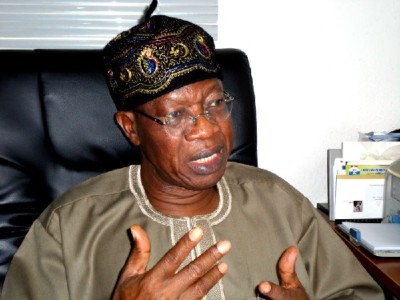Alhaji Lai Mohammed, the Publicity Secretary of the ruling All Progressives Congress (APC) is ordinarily, a quiet, shy-looking man. That is how those of us who have known him over the decades see him. But as spokesperson of the opposition, he became so fiery and effective that under the Obasanjo administration, some feared for his safety. So I wrote a piece “Watching over Lai Mohammed.”
Those were years before APC was born. With the change party, he fully blossomed into a mass media warrior taking especially on the then ruling party. Like or dislike him, he could not be ignored and he came to set a standard in inter party warfare. So when he was nominated a Minister, lots of drama and fireworks were expected at his confirmation hearing where the opposition party had a solid forty nine seats in a 109-seat Senate. If there were two major nominees expected to be drilled in what has become a political war of attrition, he was expected to be one of them. A battle of wits was expected. Even for Senators who might have been nominated, the Senate had announced that the era of ‘Take a bow and go’ was over; every nominee was to pass through the crucible. But when Lai Mohammed galloped into the Senate, escorted by party heavy weights, a shocked nation watched as he was asked to take a bow. Since he had never been a Senator, why the special treatment? With this, his confirmation seemed a forgone conclusion. But there were some controversy when a voice vote was called by Senate President, Bukola Saraki. What might not have been considered was that the voices of the opposition PDP Senators could be very loud when it came to the issue of a man who doubtlessly played a major role in the transformation of their ordained ruling party into the opposition.
The ears of the Senate President, more so given the crucial role he plays in the Senate, must be very sharp. His ears, as the third highest political officer holder, are doubtlessly full. He has to listen to all sorts: the truth, half-truth and falsehood. Given this reality, he must have learnt to filter what he hears, or thinks he hears. It will also be natural for him as he takes in all sorts of information, disinformation and misinformation, to shut out what he does not want to hear. Conversely, he can also take in what he wants to hear. But all these might be at the level of the subjective.
So the ears, doubtlessly, help the Senate President to also maintain political balance. When it came to Lai Mohammed, Saraki needed a good balance. First, although they belong to the same school of political change, they are of different tendencies. Given the low intensity combat that attended the enthronement of Saraki as Senate President, many would have watched out for his body language. Second, they are both Kwarans, with Ilorin as capital. Ilorin, from the days of the Afonja-Alimi intrigues and betrayal, has been famous for deft political moves where an individual’s loyalty to himself, rather than the collective, is not uncommon. Third, both men contested the 2003 Kwara State gubernatorial elections in which Mohammed, flying the defunct Alliance for Democracy ticket was defeated.
With such deficit, how will it be seen if Lai Mohammed were not to scale the screening hurdle in a Senate presided by Saraki? Would the Senate President have been able to convince anyone that he was not part of a plan to deny his kinsman a ministerial slot? This is more so when Saraki was said to have had his loyalist in mind to pick the Kwara State ministerial slot. If Mohammed was asked to take a bow, why would the same Senate deny him confirmation?
So when the Distinguished Senators roared “Ayes’ and ‘Nays’ there could only have been one conclusion, the ‘Ayes have it.’ The controversy must have stemmed from the possibility that some misinterpreted the vibration from the roar; in other words, they used their middle ear, while Saraki used his inner ear. Saraki’s ears are perfect; what he ears as Senate President, is what the Senate ears; so wisely, nobody challenged his ruling that Lai Mohammed is confirmed a minister of the Federal Republic.
The ears of the Distinguished can also be attuned to that of their President. Screening is not about the eloquence of nominees. Otherwise, it will be easy for the camel to pass through the eye of a needle. So while Nigerians would have been applauding the performance of a Raji Fashola, Ibe Kachikwu or Kemi Adeosun, the ears of Senators would have been more for the message, rather than the manner of delivery. I am sure Senators were conscious that it was not only the nominees that were in public view; they themselves were. Good we now have Ministers; our ears are itching for the news that governance has fully taken off.
PREMIUM TIMES
END


Be the first to comment